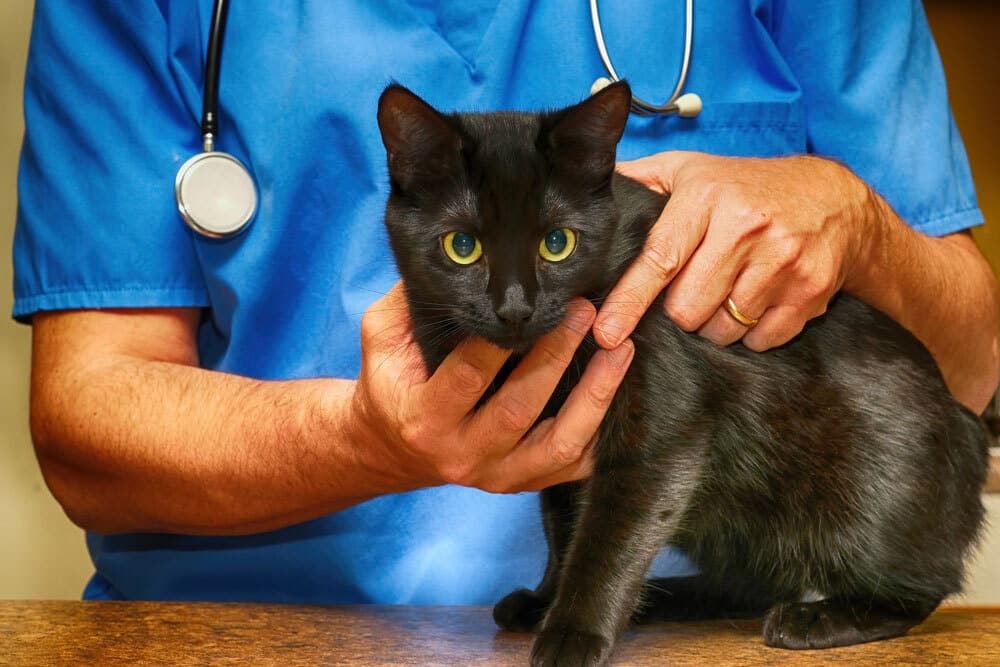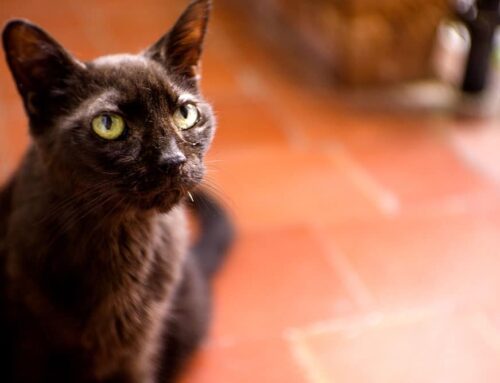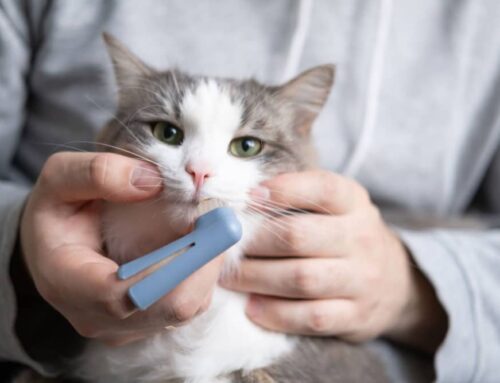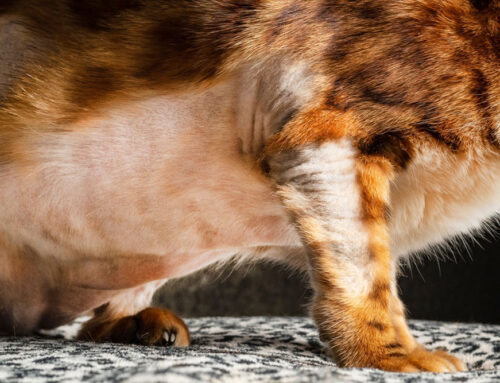Feline Hyperthyroidism Explained: Recognizing the Signs Early
Is your senior cat eating more but losing weight? Do they pace at night or seem restless when they once slept soundly? These subtle changes may point to hyperthyroidism, one of the most common conditions in older cats.
At Just Cats Clinic, our feline-focused team helps families recognize early warning signs and provides treatment plans that protect both health and quality of life. Because hyperthyroidism can affect multiple organs- including the heart, kidneys, and eyes- early detection truly makes all the difference.
Understanding Hyperthyroidism in Cats
What is Hyperthyroidism?
Hyperthyroidism occurs when your cat’s thyroid gland produces excessive thyroid hormone, putting the entire body into overdrive. It’s like your cat’s internal engine running too fast- causing everything from heart rate to metabolism to accelerate. Because thyroid hormones affect nearly every organ system, symptoms can appear varied or even contradictory.
This condition primarily affects older cats, with most diagnosed after eight years of age. Unlike many age-related diseases that slow cats down, hyperthyroidism can make them seem more energetic or even anxious, which can delay diagnosis.
Causes of Hyperthyroidism
The exact cause isn’t fully understood, but several factors may contribute:
- Environmental exposures: Certain flame retardants, canned food linings, and cat litters may influence thyroid function over time.
- Dietary factors: Cats fed exclusively canned foods- especially fish or liver varieties- show higher rates of disease. These recipes may naturally contain more iodine or compounds that stimulate thyroid hormone production.
- Age and genetics: Older cats and certain breeds appear more predisposed.
Symptoms to Watch For
Early signs often develop gradually, so it’s easy to attribute them to normal aging. Recognizing them early can significantly improve outcomes.
- Weight loss despite increased appetite
- Restlessness, nighttime pacing, or excessive vocalization
- Rapid heart rate or irregular heartbeat
- Increased thirst and urination
- Vomiting, diarrhea, or greasy unkempt coat texture
- Behavioral changes such as irritability or anxiety
Coexisting conditions like chronic kidney disease often complicate treatment, making early diagnosis and regular screening vital.
The Importance of Early Detection
Why Early Detection Matters
Hyperthyroidism affects far more than the thyroid alone. Elevated hormone levels push the heart to work harder, which can lead to high blood pressure (hypertension)– a dangerous but often silent complication. Over time, hypertension can damage delicate blood vessels in the eyes, kidneys, heart, and brain, leading to serious or even irreversible problems.
Cats with untreated high blood pressure may experience sudden blindness caused by retinal detachment or hemorrhage. Families may first notice dilated pupils or a cat that seems disoriented or bumps into objects- symptoms often linked to feline vision problems.
Regular blood pressure monitoring allows veterinarians to catch these issues early and protect your cat’s sight, kidney function, and long-term health.
Preventive testing for senior pets is invaluable. Routine blood work and blood pressure checks can reveal elevated thyroid levels or hypertension long before symptoms appear- giving cats the best chance at a healthy recovery.
Diagnostic Methods
Diagnosis typically includes a physical exam, bloodwork, and sometimes blood pressure measurement. During preventive exams and care, veterinarians may detect an enlarged thyroid, a fast heart rate, or early weight loss.
Thyroid hormone levels are measured through simple blood tests. Cats with borderline or inconsistent results may require additional diagnostics or short-term monitoring to confirm disease. At Just Cats Clinic, our feline-exclusive team interprets these subtle variations with expertise, ensuring early and accurate detection.
Rethinking “Healthy Senior” Signs
It’s easy to assume increased appetite or activity means your cat is thriving, especially if they previously seemed lazy or overweight. In reality, these are often the earliest red flags of hyperthyroidism.
Left untreated, the disease can progress quickly, straining the heart, elevating blood pressure, and increasing the risk of sudden vision loss. Addressing the condition early prevents these complications and supports your cat’s comfort and long-term wellbeing.
Treatment Options for Hyperthyroidism
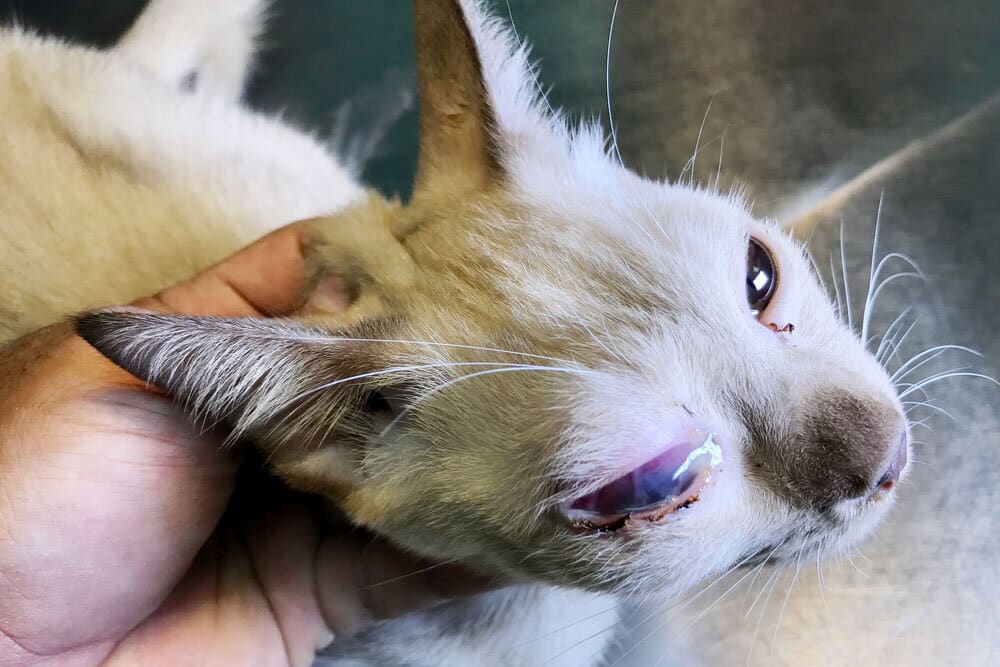
Medical Treatments
Daily oral medication is one of the most common and effective ways to manage hyperthyroidism. It works by blocking excessive hormone production, restoring balance within weeks. Regular rechecks ensure proper dosing and help catch potential side effects early.
Radioactive iodine therapy offers a more permanent option. This targeted treatment destroys overactive thyroid tissue while preserving healthy cells. It requires a short hospital stay but often results in a complete cure- no daily medication needed.
Surgical Solutions
Surgical removal of the affected thyroid tissue (thyroidectomy) can also be curative. At Just Cats Clinic, our surgery and diagnostics services are tailored to each cat’s age, health status, and disease severity. Specialized anesthesia protocols and senior-focused monitoring ensure safety and comfort during every procedure.
Nutrition
Prescription diets designed for hyperthyroid cats restrict iodine, reducing thyroid hormone production. While dietary therapy can help mild cases or serve as a supportive option, it works best under close veterinary supervision. Managing feeding in multi-cat households may require creative solutions to ensure consistent results.
Monitoring and Follow-Up Care
Managing hyperthyroidism is an ongoing process. Regular follow-up visits help monitor thyroid hormone levels, blood pressure, and kidney function- since all three are closely connected.
Cats whose blood pressure remains elevated may need antihypertensive medication to protect the eyes and kidneys. By staying consistent with rechecks, families can catch changes early and adjust treatment before complications develop.
Living with Hyperthyroidism: What to Expect
With proper treatment, most cats return to a healthy weight, calmer behavior, and improved energy. Routine monitoring remains important because both the thyroid and blood pressure can fluctuate over time.
Keep up with scheduling appointments for rechecks, and know when to seek urgent cat care. Difficulty breathing, extreme lethargy, or sudden vision loss require immediate evaluation.
Common Questions and Concerns
- How long can cats with hyperthyroidism live?
With treatment and monitoring, most cats live normal, healthy lifespans. - Can hyperthyroidism cause blindness?
Prolonged high blood pressure can damage the eyes. Monitoring and early intervention help prevent this complication.
Supporting Your Cat’s Health Journey
Hyperthyroidism may sound daunting, but it’s highly manageable with prompt diagnosis, consistent monitoring, and a feline-focused veterinary team.
If you’ve noticed increased appetite with weight loss, nighttime restlessness, or sudden vision changes, don’t wait. Our experienced veterinarians will tailor a plan that supports your cat’s thyroid, heart, and blood pressure health- so they can continue living comfortably for years to come. Contact Just Cats Clinic at (703) 520-2702 to schedule a comprehensive evaluation.


